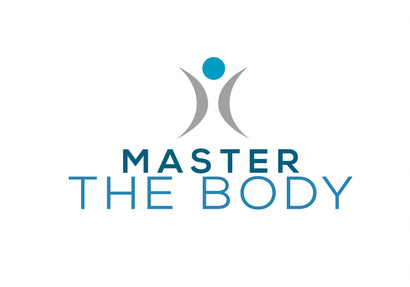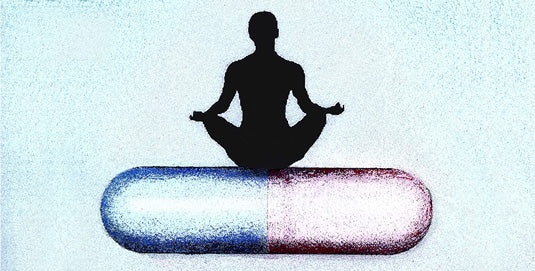
There ARE alternatives to medication for emotional and attention issues. It used to be, that if someone were to say to you that meditation or meditative like practices could alleviate depression, anxiety, ADHD, GAD (Generalized Anxiety Disorder), OCD, PTSD or other body-mind complex mental and cognitive problems most people would roll their eyes and think 'that's New Age nonsense.' But there is research - real research showing that this is the case. With the above disorders, individuals can display uncontrollable, intrusive thoughts, obsessions and compulsions in an attempt to reduce their symptoms. This can clearly become dysfunctional not only externally but internally and be emotionally painful. Unfortunately, medications used for these issues have well documented potential side effects.
Obviously, there are many cases where the medications are extremely helpful but when they are harmful, they are usually monumentally so. There are plenty of documented cases of this which can be found even if you do a generalized search on the subject, so I will not browbeat the issue here.
Thankfully, research now shows good reasons why medication may not be the only OR best option with respect to mood/attention, neurotransmitter imbalances. In some cases, meditation works as well or better than the medications that are used for these issues.
A few good reference studies with respect to this are linked at the bottom of this post,
there are much more available through National Institutes of Health website.
The positive effects of meditation include balancing levels of neurotransmitters such as dopamine, serotonin, melatonin, GABA and even the stress hormone cortisol. Why is this important? Because these neurotransmitters have a very dramatic effect on mood, physical energy, happiness and drive to act (desires) on a day to day basis. This is important because many people feel that these disorders are hardwired into the brain either by family trait genetics or some other mystical hormonal genetic issue. Realizing that these neurotransmitters and resultant mental states they help regulate, can be changed and in many instances remarkably quickly, is very freeing.
Our brains are not fixed hard wiring, which means they can change. This is one of the most exciting subjects of study in medicine called Neuroplasticity. A study in this field demonstrates neural pathways and circuits once thought to be fixed can fact change with learning and with mental exercises. This is called neural plasticity - and meditation may be a side-effect-free path to neuroplasticity and growing new neurons, called neurogenesis[1]. Additionally allowing for the forming of new connections between neurons called synaptogenesis.
Meditation which ties together the neurobiological effects of neurotransmitters, brain waves, mental exercise along with empirical evidence from experiments in psychology is proving an effective treatment for the disorders listed above. Most importantly, it does not suffer ANY side effects.
On the biological level, MRI studies (see references below) have shown that meditation is linked to a reduction in activity in the amygdala, the area of the brain that governs stress response (aka - fight or flight). This, in turn, reduces mind wandering from thought to thought, which is linked to feeling states unhappiness and stress.
Meditation is also proving function as preventive medicine; therefore, it is highly recommended by researchers to everyone and not limited to patients suffering from a disease.
The mechanisms behind the effect of meditation seem to enhance attention, body and emotional regulation. These changes can affect one's self-perspective in a positive way which plays an important role in reducing depressive states.
Anecdotally, based on the different pathological scenarios I've seen in my clinic, people need all available tools such as meditation in addition to diet and nutrition if we are to ensure that mood disorders are reduced or eliminated from the global population.
This may seem absurd but it is truly possible.
With all of the present day information, tools, and techniques we have available to combat them, mood disorders could become a thing of the past.
The technique of Meditation has clearly been shown to be a very effective tool to this end. There are many different meditation techniques but I think it is sufficient to start with just becoming aware of your breathing. This can be done a few minutes daily by sitting quietly and putting your attention on your breathing, when your attention wanders, gently bring it back to the breath.
Meanwhile, you can investigate and try different meditation techniques to see what works best for you to practice in the long-term.
Wishing you and your family the best in health!
-Dr. Lorn Allison
A little more information about mood disorders:
Anxiety disorders affect approximately tens of millions of adults in the United States, ages 18 and older, in a given year [2]. A large national survey found 8% of teens (13 to 18 years) have some form of anxiety disorder. Anxiety disorders come in several types as mentioned above. Apart from Generalized Anxiety Disorder (GAD), when one worries excessively, Obsessive-Compulsive Disorder (OCD) is another type of anxiety disorder in which affected individuals display uncontrollable, intrusive thoughts, obsessions and compulsions in an attempt to reduce the anxiety. Post-Traumatic Stress Disorder (PTSD) is when the victims who have been directly or indirectly affected by a traumatic event, suffer distress and either display avoidance symptoms, re-experiencing symptoms, or hyper-arousal symptoms [3]. Social anxiety is not only the fear of having to be in front of people but is also the fear of engaging in social activities because the sufferer is anxious about being judged [4]. And lastly, anxiety also stems from phobias—an intense fear of a certain specific stimulus.
References for this post:
1. https://www.ncbi.nlm.nih.gov/pmc/articles/PMC2944261/ Buddha's Brain: Neuroplasticity and Meditation
2. Kessler RC, Chiu WT, Demler O, Walters EE. Prevalence, severity, and comorbidity of 12-month DSM-IV disorders in the National Comorbidity Survey Replication. Archives of general psychiatry. 2005;62:617–627. [PMC free article] [PubMed]
3.http://www.nimh.nih.gov/health/publications/teenage-brain-a-work-in-progress-factsheet/index.shtml. National Institute of Mental Health. Anxiety Disorders In Children and Adolescents.
4. Association AP. Diagnostic and statistical manual of mental disorders, (DSM-5®) American Psychiatric Pub; 2013.
Other References:
- Meditation and yoga can modulate brain mechanisms that affect behavior and anxiety – a modern scientific perspective:
https://www.ncbi.nlm.nih.gov/pmc/articles/PMC4769029/
- Meditation or medication mindfulness training versus medication in the treatment of childhood ADHD: a randomized controlled trial:
https://www.ncbi.nlm.nih.gov/pmc/articles/PMC4962453/
- Association AP. Diagnostic and statistical manual of mental disorders, (DSM-5®) American Psychiatric Pub; 2013.
- Forbes article: Four depression treatment, meditation might rival medication
https://www.forbes.com/sites/alicegwalton/2014/01/07/for-depression-treatment-meditation- might-rival-medication/#3389a4473b95
- How to increase serotonin in the human brain without drugs:
https://www.ncbi.nlm.nih.gov/pmc/articles/PMC2077351/ 


 Most SC joint pain actually comes from muscle and fascia, not the joint itself. Learn about the top 3 causes including muscle & fascia issues, wear & tear, and infection - plus how targeted tissue release and postural correction can help.
Most SC joint pain actually comes from muscle and fascia, not the joint itself. Learn about the top 3 causes including muscle & fascia issues, wear & tear, and infection - plus how targeted tissue release and postural correction can help.
